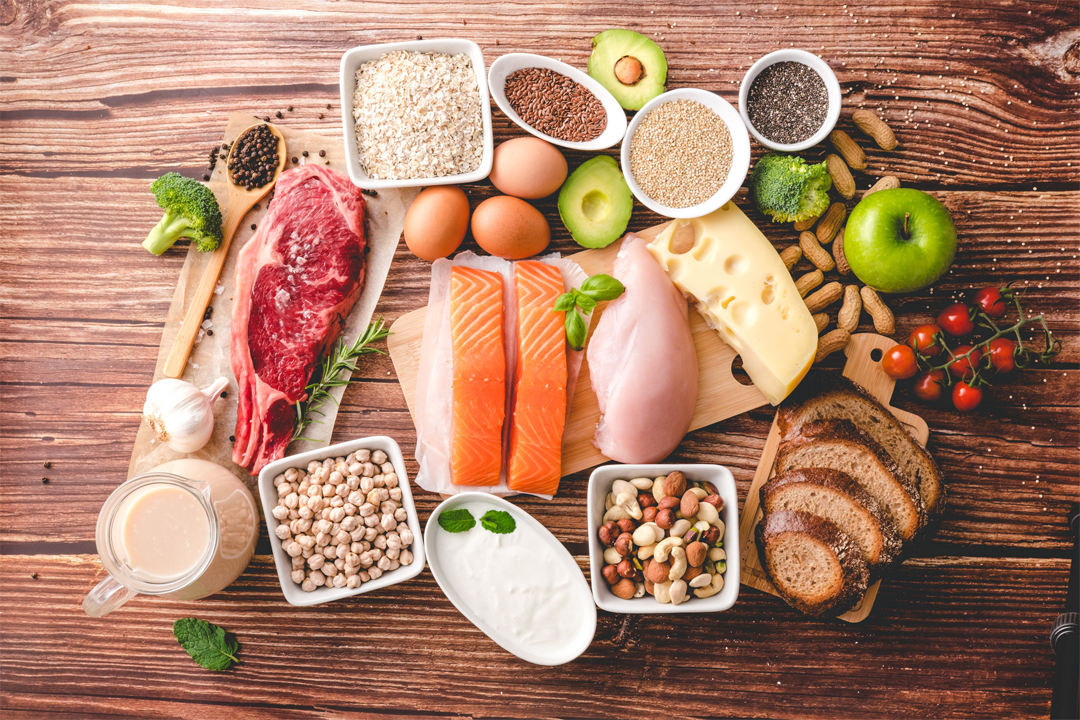
How much protein do I need?
The right amount of protein for you depends on a variety of factors, such as your gender, age, weight, body type and daily activity level. A good general recommendation is for women to eat about five to six ounces of protein a day and men about six to seven ounces per day, according to the U.S. Department of Agriculture.
Women who are pregnant or breastfeeding, and high-intensity athletes need to eat more protein each day. Foods that are high in protein also are an important part of your diet because they provide you with other vital nutrients, such as B vitamins, iron, zinc and vitamin E.
What are the benefits of high protein foods?
One of the most valuable benefits of high protein foods is that they help you burn calories while you’re digesting them. Your body uses about 20 to 30 percent of the calories in a serving of a high-protein food just processing the meal. It takes only five to 10 percent of the calories to digest foods that are high in carbohydrates. Here are some other benefits of high protein foods:
1. They keep you feeling fuller longer.
Simple carbs like processed flour and sugar move quickly through your digestive tract and are burned right away. That’s the “sugar rush” we’ve all felt. High protein, low carb foods break down slowly, leaving you feeling full longer and keeping your blood sugar levels steady.
That’s why high protein foods are especially important for diabetics, people with metabolic disorders, or anyone who needs to have plenty of energy throughout the day.
2. They help repair cells in your body.
Protein is the building block of every cell in our bodies. As you go about your daily life, your cells are constantly being replenished. Eating a diet rich in high protein foods ensures you have a steady supply to produce new cells as needed.
3. They are critical for muscle building.
When you’re hitting the gym regularly, training for a marathon, or doing any kind of hard exercise, your muscles are under constant strain. High protein foods help them recover and prepare you for the next workout session.
4. They help preserve muscle mass.
If you’re dieting to lose weight or you’re just getting older, your body can begin to lose its muscle mass. Of course, muscle is important for your daily activities. Muscle also burns more calories when you’re at rest than fat does, so maintaining your muscle mass helps you stay at a healthy weight. Eating high protein, low calorie foods gives your body what it needs to preserve muscle mass.
5. They support hair and nail health.
Your hair and nails are made primarily of protein. When you don’t get enough protein in your diet, it can lead to hair loss and brittle nails. If you want thick, shiny hair and smooth, hard nails, be sure to include high protein foods in your meals.
6. They enable enzyme function.
The compounds in your body that break down food and regulate your hormones are enzymes, which are a product of the different amino acids in protein. High protein foods are key to healthy digestion and so many other important functions we never think about.
7. They support bone health.
Our bones become thinner and more brittle as we age. A diet rich in high protein foods has been found to slow the process of bone loss and may prevent the fractures that are more common after we get to be 65 years old.
8. They help you maintain a healthy weight.
High protein low carb diets are popular because you stay energetic and are not feeling hungry all day even while you are shedding excess pounds. What’s more, high protein foods activate the hormones that tell you when you are full as you’re eating, while consuming protein reduces the levels of hunger hormones.
Which high protein foods are best?
You can get protein from lots of different foods, but not all protein is the same. The best high protein foods come with the nine essential amino acids that your body can’t make. Meat, fish and seafood, eggs and dairy products are all considered complete proteins. Some high protein diets encourage eating any kind of protein, including foods that are high in calories and sodium, such as bacon and other processed meats.
The healthiest options, however, are low in saturated fat and do not have lots of added salt. Those include white meat chicken and turkey, lean cuts of beef and pork, and non-fat milk and yogurt. They give you all the protein you need but they are lower in calories than other high protein foods. Eggs, turkey bacon, chicken sausage, low-fat yogurt or cottage cheese, and smoked salmon are breakfast foods that are high in protein. They’re low in calories and fats, yet still power up your morning.
Meat-free choices
People who do not eat animal foods need to pay particular attention to getting enough protein each day. The best high protein foods for vegetarians are tofu and other soy-based foods, beans such as lentils, and nuts. To stay healthy and strong, vegetarians and vegans should include some of these foods in every meal. Alternatively, they could opt for a food substitute like Kirkland protein bars.
Balance is best, regardless of your diet
High protein foods are important, but a healthy diet includes the right amounts of other nutrients, too. About 50 to 60 percent of your daily food consumption should be complex carbohydrates, such as fresh vegetables and fruit and whole grains. You also need about 20 percent of your calories from healthy, unsaturated fats. They fill you up and help your body absorb the vitamins and minerals in your food. The remainder of your calories should come from high protein foods.
Signing up for a dietitian-designed meal plan makes sure you’re eating the right proportions of each nutrient. It’s like having your own personal nutritionist and chef.
Comments
comments